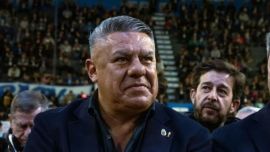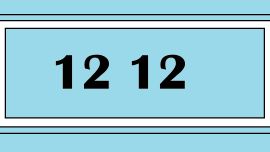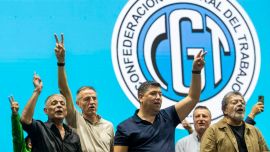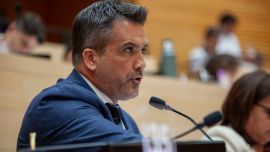Honduras' president-elect Xiomara Castro made a last ditch attempt late Wednesday night to solve a congressional crisis with hours left before her inauguration.
The 62-year-old is due to be sworn in as the country's first woman president later today, but confusion reigns over who will be head of congress during her four-year term.
Two rival factions in Castro's left-wing Libre party have voted in their own president of congress and negotiations to reach a solution stalled overnight on Wednesday.
Luis Redondo, who has the support of Castro and much of her party, has been invited to preside over her inauguration.
However, rebel deputy Jorge Cálix, bolstered by the right-wing opposition National and Liberal parties, has the support of more than 70 of the 128-member congress, including close to 20 Libre deputies.
Castro made a last-ditch attempt to resolve the dispute on Wednesday night by offering Cálix the job of Cabinet Coordinator – a similar role to chief of staff or cabinet chief – in her government, in a bid to convince him to drop his claim to the congress president role.
"I proposed to Jorge Cálix that he joins my government in the position of Cabinet Coordinator for the sake of uniting in the Reformation of Honduras," Castro wrote on Twitter.
Calix sparked hope of a breakthrough by replying: "Thank you President @XiomaraCastroZ, it was a great pleasure speaking with you. For me and for anyone, it would be a great honour to form part of the government of resistance and national reconciliation. You will soon receive my answer," he wrote.
The congress dispute is an embarrassing distraction for the president-elect, with Argentina's Vice-President Cristina Fernández de Kirchner, US Vice-President Kamala Harris, King Felipe VI of Spain and Taiwan Vice President William Lai due to attend the inauguration.
Control of parliament is key to Castro's anti-corruption and political reform platform in a country battered by poverty, migration and drug-trafficking.
'Deep crisis'
Once she assumes office, Castro, 62, will inherit "a country in a deep crisis – above all a social crisis – whose despair, whose deterioration of living conditions have become so profound," Eugenio Sosa, a sociologist at the National University of Honduras, told AFP.
The "main reflection" of the crisis, he added, "is in the massive exodus of families to the United States."
But before tackling those challenges, Castro must first resolve the congress dispute.
The schism emerged last Friday when a group of Libre dissidents ignored an agreement with the Saviour Party of Honduras (PSH), whose support was key to Castro winning the November elections.
PSH leader Salvador Nasralla agreed to withdraw from the presidential race in return for the position of vice-president and a pledge to support the PSH's Redondo as president of congress.
But dissidents refused, arguing that congress should be led by the party with the most members – Libre has 50 deputies, to just 10 for the Saviour party.
The dispute turned nasty, with some deputies coming to blows.
Castro accuses the dissidents of allying with the National Party of outgoing president Juan Orlando Hernández to prevent the changes she promised in her campaign, including the restitution of laws against impunity that were rolled back by the previous administration.
Migration talks
During her visit, US vice president Harris is due to hold talks with Castro on the root causes of Central American migration toward the United States, a senior US official said.
"The topics will include expanding economic opportunity, combating corruption, and humanely managing migration," the official added.
Some 71 percent of the close to 10 million Hondurans live in poverty, according to the FOSDEH NGO.
"Everyone wants to leave because there's no work. If there were more work opportunities here, there would be no need to look for another country," university student Jensi Davila told AFP in central Tegucigalpa.
Honduras is also wracked by violence instigated by criminal gangs involved in drug-trafficking. The murder rate is close to 40 per 100,000 inhabitants.
Lai is due to hold separate talks with Castro and Belize Prime Minister John Briceño during his visit.
Taiwan's Foreign Ministry said Lai's meeting with Castro would be "to exchange views on issues of mutual concern."
Honduras is among just 14 countries that still recognise democratic, self-ruled Taiwan.
China, which considers Taiwan as its own, has spent decades successfully encouraging the island nation's allies to switch sides.
During her election campaign, Castro vowed to "immediately open diplomatic and commercial relations with mainland China" if she won.
– TIMES/AFP























Comments